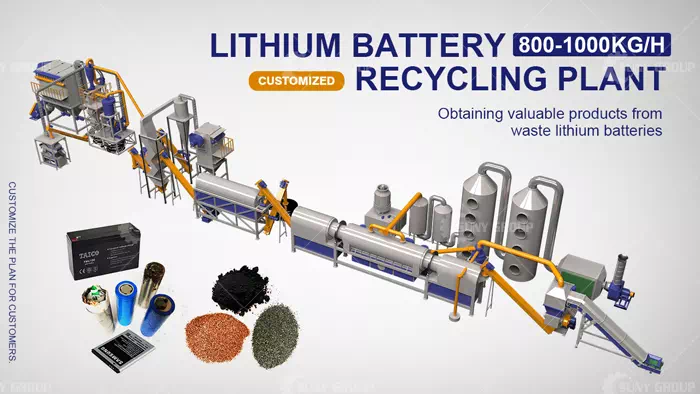Processing and recycling lithium-ion batteries often requires the use of a range of equipment and processes to ensure the safe and efficient handling of these potentially hazardous materials. The following are some of the equipment commonly used in lithium-ion battery processing and recycling:
Battery sorting and disassembly equipment: These equipment are used to sort and disassemble different types of lithium-ion batteries. They can be identified and separated based on the battery's chemical composition, size and other characteristics, either manually or automatically.
Battery Crusher: Battery Crusher is used to mechanically break batteries into smaller pieces. This process helps expose the components inside the battery for further separation.

Equipment for processing recycling lithium ion batteries
Screening and Separation Equipment: After crushing, screening and separation equipment is used to separate the different components of the battery. These devices use technologies such as screening, magnetic separation and gravity separation to separate materials such as metals, plastics and electrolytes.
High-temperature furnace: High-temperature furnace is used for heat treatment of battery components. By smelting or roasting the material at high temperatures, it helps recover valuable metals.
Leaching and Extraction Equipment: Leaching equipment is used in chemical extraction processes. They use solvents or acids to dissolve battery materials and extract valuable metals such as lithium, cobalt, nickel and copper.
Electrochemical processing equipment: Electrochemical processing processes, such as electrolysis or electrorefining, are used to refine and purify recovered metals for reuse.
Battery Material Recovery Systems: These systems use a variety of techniques such as hydrometallurgy, pyrometallurgy, and mechanical processing to recover valuable materials from lithium-ion batteries. The goal is to maximize resource utilization and reduce waste generation.
Safety Equipment: Handling and processing lithium-ion batteries requires appropriate safety measures. Use personal protective equipment (PPE) such as gloves, goggles and respiratory protection. In addition, fire extinguishing systems, explosion-proof containers and ventilation systems are required to ensure a safe working environment.
It is important to note that the lithium-ion battery recycling process may vary depending on the specific technology, battery size and recycling facility capabilities. Complying with environmental regulations and safety guidelines is critical to minimizing environmental impact and protecting worker health and safety.
Thank you for your interest in suny group. If you want to learn more about our E-waste recycling plant, copper wire recycling machine and other machines, Contact us now to find out what we can do for you next project!E-mail:sunymachine@gmail.com | Whatsapp:+8613674945231